【精品】仁爱版英语八年级下册全册语法复习.ppt
合集下载
仁爱版八年级下英语教材梳理复习课件

及时巩固 1.用loud,loudly,aloud填空 (1)He heard a cock crow loudly . (2)He has a loud voice. (3)The boy is crying aloud .
2.alone/lonely 1)alone可以作形容词,也可以作副词,表示“单独,独自”,不表示心理上的 “孤独”,常作表语或状语,不能作定语。如: He isn't alone because he lives with his family. 他不是单独无伴的,因为他和家人住在一起。 2)lonely是形容词,常作定语或表语。作表语时,强调人的主观感受,表示心理 上的“孤独,寂寞”;作定语时,意为“偏僻的,人迹罕至的”,常用来修饰表示 地点的名词。如: Mary feels lonely in the new city. 玛丽在这个新城市里感到寂寞。
注意 loudly比用作副词的loud使用范围更广,它除与speak、talk、laugh等 动词连用外,还可与其他表示声响的动词连用,且可以放在这些动词之前或 之后。如: The man snored loudly.这个人鼾声打得响。 另外,在用于比较级或最高级时,通常用 loud,而不用 loudly。如: Who laughed loudest?谁笑的声音最大?
2)neither(两者)都不,neither...nor...既不……也不……。如: Neither you nor he has made the mistake. 犯错误的既不是你也不是他。
4.He refused to play soccer or go to the movies with his friends.他拒绝和他的朋 友们去踢足球或者看电影。(P16) 基本用法 refuse v.拒绝,回绝。后面常接名词、代词或动词不定式作宾 语。如: The patient has the right to refuse treatment.病人有权利拒绝接受治疗。 I refuse to answer that question. 我拒绝回答那个问题。 拓展 refuse用作名词时意思是“废弃物,垃圾”,是不可数名词。如: The water was full of flotsam and refuse. 水里满是废弃物和垃圾。
仁爱版八年级下英语语法课件
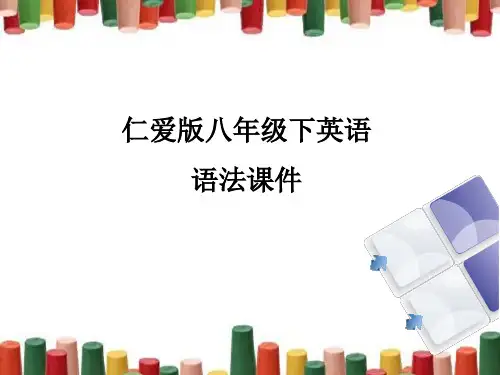
仁爱版八年级下英语 语法课件
单元语法课件 宾语从句
语法点击
宾语从句
在初中阶段,宾语从句是重要的语法点,与宾语从句有 关的考点有很多,常见的有,
考点1:宾语从句的引导词 宾语从句的引导词有三类,分别是
that
表陈述语气,通常可以省略。
if/whether
表疑问语气,意为“是否”。
特殊疑问词
常见的特殊疑问词有when, where, how, what, why等。
考点3:宾语从句在时态上应遵循时态呼应原则 在宾语从句中,谓语动词时态要受到主句谓语动词时态的制 约,一般要遵循以下三条原则: 1.如果主句是祈使句或主句中的谓语动词是一般现在时或 一般将来时,则宾语从句可根据实际需要选用时态。如: Mary says she will come back soon. Will you tell us which places you visited during the vacation?
考点4:宾语从句的“否定转移” 当主句的谓语动词为think, believe等词,且主语为第一 人称时,从句中的否定词not应转移到主句谓语动词。如: I think. She can't come.(合并为一句) →I don't think she can come.
考点5:宾语从句的简化结构 由特殊疑问词引导的宾语从句通常可以简化成“特殊疑问词 +不定式”结构,此时主从复合句也就变成了简单句,但简化 必须符合以下两种条件: 1.简单句的疑问词为原宾语从句的引导词; 2.原从句的主语应与主句的主语或间接宾语一致。 I don't know what I should do next.(改为简单句) →I don't know __w__h_a_t_to__d_o_n__ex_t______.
单元语法课件 宾语从句
语法点击
宾语从句
在初中阶段,宾语从句是重要的语法点,与宾语从句有 关的考点有很多,常见的有,
考点1:宾语从句的引导词 宾语从句的引导词有三类,分别是
that
表陈述语气,通常可以省略。
if/whether
表疑问语气,意为“是否”。
特殊疑问词
常见的特殊疑问词有when, where, how, what, why等。
考点3:宾语从句在时态上应遵循时态呼应原则 在宾语从句中,谓语动词时态要受到主句谓语动词时态的制 约,一般要遵循以下三条原则: 1.如果主句是祈使句或主句中的谓语动词是一般现在时或 一般将来时,则宾语从句可根据实际需要选用时态。如: Mary says she will come back soon. Will you tell us which places you visited during the vacation?
考点4:宾语从句的“否定转移” 当主句的谓语动词为think, believe等词,且主语为第一 人称时,从句中的否定词not应转移到主句谓语动词。如: I think. She can't come.(合并为一句) →I don't think she can come.
考点5:宾语从句的简化结构 由特殊疑问词引导的宾语从句通常可以简化成“特殊疑问词 +不定式”结构,此时主从复合句也就变成了简单句,但简化 必须符合以下两种条件: 1.简单句的疑问词为原宾语从句的引导词; 2.原从句的主语应与主句的主语或间接宾语一致。 I don't know what I should do next.(改为简单句) →I don't know __w__h_a_t_to__d_o_n__ex_t______.
仁爱版八年级下Unit6 Topic 2总复习课件(共19张PPT)
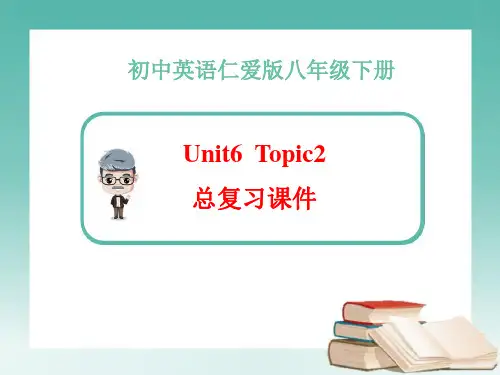
He sang as he worked. 3)用于平行发展的结构中,表示"随着……"。 As it grew darker it became colder. As he grew older he became more confident.
语法加油站
总结本单元的语法知识,你掌握了吗
4. after, before, as soon as, not…until after表示主句的动作发生在从句动作之后; before表示主句的动作发生在从句动作之前; as soon as表示 “一……就……”; not…until表示“直到……才”。 You should make a good plan before you do anything important. I’ll call you as soon as I come back. She didn’t go to bed until her mother came home.
8. They were very cute and we couldn’t help watching them. 它们太可爱了,我help doing sth.意为“禁不住/忍不住做某事”。
9. While we were having fun exploring, I found that Darren was lost. 当我们兴致勃勃考察时,我发现达伦不见了。
词汇训练营
单词填空,考查综合运用能力!
二、根据所给汉语意思或首字母提示填空。
1. My father is in Hainan on v_o_c_a_t_io_n___. 2. I’m very glad to r_e_c_ei_v_e_ a letter from my sister. 3. Last week we worked on a farm. What a wonderful __e_x_p_e_r_i_e_n_c_e_(经历)! 4. The doors of the buildings have the sign “Pull” or “P_u_s_h______”. 5. —Would you like to go c_a_m_p_i_n_g__ with me next month? —Sorry, I don’t like to stay in the field at night. 6. Lucy gets a p_o_s_tc_a_r_d___ on New Year’s Day. It’s from one of her old friends.
语法加油站
总结本单元的语法知识,你掌握了吗
4. after, before, as soon as, not…until after表示主句的动作发生在从句动作之后; before表示主句的动作发生在从句动作之前; as soon as表示 “一……就……”; not…until表示“直到……才”。 You should make a good plan before you do anything important. I’ll call you as soon as I come back. She didn’t go to bed until her mother came home.
8. They were very cute and we couldn’t help watching them. 它们太可爱了,我help doing sth.意为“禁不住/忍不住做某事”。
9. While we were having fun exploring, I found that Darren was lost. 当我们兴致勃勃考察时,我发现达伦不见了。
词汇训练营
单词填空,考查综合运用能力!
二、根据所给汉语意思或首字母提示填空。
1. My father is in Hainan on v_o_c_a_t_io_n___. 2. I’m very glad to r_e_c_ei_v_e_ a letter from my sister. 3. Last week we worked on a farm. What a wonderful __e_x_p_e_r_i_e_n_c_e_(经历)! 4. The doors of the buildings have the sign “Pull” or “P_u_s_h______”. 5. —Would you like to go c_a_m_p_i_n_g__ with me next month? —Sorry, I don’t like to stay in the field at night. 6. Lucy gets a p_o_s_tc_a_r_d___ on New Year’s Day. It’s from one of her old friends.
仁爱版 八年级下册 Unit 7 语法专项(共20张PPT)
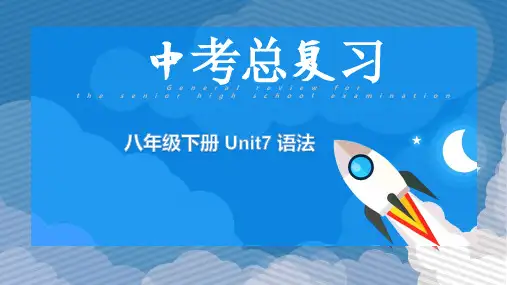
Thank you!
用助动词代替后面的动词。该动词或助动词可以省略。
如:I sing better than she (does).
我唱歌比她唱得好。
3.修饰词:副词比较级前常用even, still ,a lot,far , much , a little,等副词修饰。表示“更……”,这也可以作 为判断比较级的依据。 如:My brother did much better in his lessons than I. 我哥哥功课学得比我好多了。 4.如何对比较级进行提问?
museum.
我很难说我们是否有时间参观博物馆。
(二)下列情况下,if与whether不能互换使用。
1. 在
只能用whether,不能用if。
It depends on whether he is ready.
这件事要看他是否有准备。
I’m not interested in whether you’ll come or not.
恐怕你错了。
I'm that you are ready to help others. (形容词宾)
我很高兴你乐意帮助别人。
学习宾语从句应注意几点:
(1)引导词
(2)时态(时态一致)
(3)语序(陈述)
三、if或whether引导的宾语从句
用法
(一)由连接词if或whether引导的宾语从句,
1.实际上是
英语中有些
。
如:late,hard,near,high,deep等,
它们不用加ly,就可以直接使用。
3.那么hardly,freely这些词是怎么回事呢? 。
如:late晚地-lately近来, hard努力地-hardly几乎不, near靠近-nearly差不多, high高地-highly高度地, deep深地-deeply程度“深”
仁爱版八年级英语下册unit7 Topic 1语法专项课件(共19张PPT)
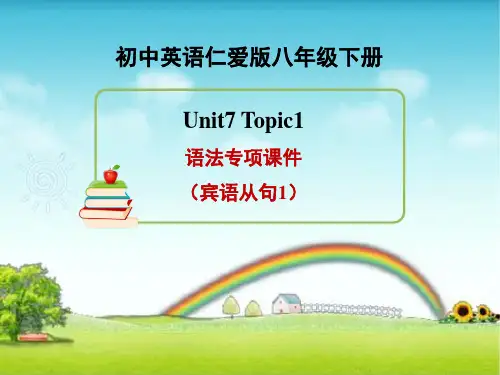
宾语从句时态
2. 如果主句的时态是一般过去时,宾语从句只能用 相应的___过__去____时态(一般过去时, 过去进行时, 过去将来时,过去完成时)。 He told me that he was born in Beijing in 1992. He said that he would go back to the U.S. soon.
宾语从句连接词 whether/if
Do you know? Does Kate get up early? Do you know if /whether Kate gets up early?
宾语从句连接词
疑问词
3.当特殊疑问句充当宾语时,由 _特__殊__疑__问__词___ 连接。
Can you tell me? What is she doing? Can you tell me what she is doing?
宾语从句必须用 陈__述__语__序__
宾语从句语序
陈述句语序
I don’t know. Where does Amy come from? I don’t know where Amy comes from.
宾语从句时态
1. 如果主句的时态是一般现在时,宾语从句的时态 根据具体情况来确定,可以是___任__何____时态。 I don’t think (that) you are right. Please tell us where we’ll go fishing tomorrow. Do you know when Mr. Smith moved here?
15、一年之计,莫如树谷;十年之计,莫如树木;终身之计,莫如树人。2021年7月2021/7/292021/7/292021/7/297/29/2021
仁爱版八年级英语下册Unit 8 Topic 3 复习课件(共22张PPT)
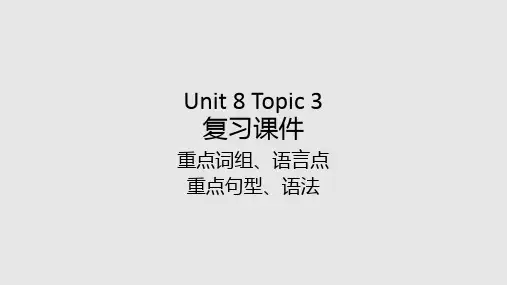
• become known to\as…=be famous to\for 被某人所熟知/作为……被人所熟知
• express wearer’s personal style attractive • choice(名) choose(动)chose(过去式)
重点词组:
• widely known=well-known 被……所熟知 • at one time 曾经 in the past在过去 • out of style过时 in style 时髦 • outside a clothing store= out of a clothing store
语言点、重点句型:
1. Many famous models will be there to model the clothes. 许 多著名的模特将去那里展示时装。 model n.意为“模型,模式;模范,典型;模特”,为可 数名词。 如: a fashion model 一位时装模特 a model plane 一个飞机模型 model v.意为“展示”,尤指职业模特展示服装。 在此句 中第一个model是名词,第二个是动词。如: David is modeling a grey suit designed by Armani. 大卫正在展示一件由阿玛尼设计的灰色西装。
重点语法:宾语从句
宾语从句的时态 1. 如果主句的时态是一般现在时,宾语从句该用什么时态就用什 么时态。即,从句可用所需的任何时态 如: I don’t think (that) you are right. Please tell us where he is. Can you tell me how I can get to the railway station? He says Mary is playing with the cat . He says Mary often plays with the cat. He says Mary will play with the cat. I think he left yesterday morning.
• express wearer’s personal style attractive • choice(名) choose(动)chose(过去式)
重点词组:
• widely known=well-known 被……所熟知 • at one time 曾经 in the past在过去 • out of style过时 in style 时髦 • outside a clothing store= out of a clothing store
语言点、重点句型:
1. Many famous models will be there to model the clothes. 许 多著名的模特将去那里展示时装。 model n.意为“模型,模式;模范,典型;模特”,为可 数名词。 如: a fashion model 一位时装模特 a model plane 一个飞机模型 model v.意为“展示”,尤指职业模特展示服装。 在此句 中第一个model是名词,第二个是动词。如: David is modeling a grey suit designed by Armani. 大卫正在展示一件由阿玛尼设计的灰色西装。
重点语法:宾语从句
宾语从句的时态 1. 如果主句的时态是一般现在时,宾语从句该用什么时态就用什 么时态。即,从句可用所需的任何时态 如: I don’t think (that) you are right. Please tell us where he is. Can you tell me how I can get to the railway station? He says Mary is playing with the cat . He says Mary often plays with the cat. He says Mary will play with the cat. I think he left yesterday morning.
仁爱版八年级英语下册Unit 8 Topic 2 复习课件(共27张PPT)
Do you have any clothes for cleaning the furniture? 你有擦家具的布吗?
变化很大
• on special days 在特别的日子里
• the same as ...
与…...一样
• in fact
事实上
重点词组:
• at Christmas
在圣诞节期间
• as well as…
除了…... 之外(也)
• make sth. for sb.= make sb. sth.给某人做某物
语言点、重点句型:
1. Could you tell me when you wear your uniforms? 你能告诉 我,你们什么时候穿制服吗? when引导宾语从句时意为“何时,什么时候”。如: Do you know when they will come? 你知道他们什么时候会 来吗?
In the forest you should protect yourself from snakes.在森林里,你 要防止毒蛇咬伤。
(2) heat 意为“热”。如:
He could feel the heat of the sun on his back. 他能感觉到太阳照射 在背上的热气。
语言点、重点句型:
【辨析】 dress, wear, put on (1) wear意为“穿着、戴着”、指穿戴的状态,后面接表示服装 的词,可以用进行时态。如: She is wearing a red coat. 她穿着一件红色的外色。 (2) put on意为“穿載”,指穿戴的动作。如: It’s cold today. = Please put on more clothes. 今天天气冷,请多 穿些衣服。 (3) dress既可以作及物动词,也可以作不及物动词。 作及物动词时,意为“绐……穿衣服”,其后跟某人作宾语,不 能跟表示服装的名词。常用短语为 dress oneself/dress sb.。如: Please dress the baby.请给这个婴儿穿衣服。
变化很大
• on special days 在特别的日子里
• the same as ...
与…...一样
• in fact
事实上
重点词组:
• at Christmas
在圣诞节期间
• as well as…
除了…... 之外(也)
• make sth. for sb.= make sb. sth.给某人做某物
语言点、重点句型:
1. Could you tell me when you wear your uniforms? 你能告诉 我,你们什么时候穿制服吗? when引导宾语从句时意为“何时,什么时候”。如: Do you know when they will come? 你知道他们什么时候会 来吗?
In the forest you should protect yourself from snakes.在森林里,你 要防止毒蛇咬伤。
(2) heat 意为“热”。如:
He could feel the heat of the sun on his back. 他能感觉到太阳照射 在背上的热气。
语言点、重点句型:
【辨析】 dress, wear, put on (1) wear意为“穿着、戴着”、指穿戴的状态,后面接表示服装 的词,可以用进行时态。如: She is wearing a red coat. 她穿着一件红色的外色。 (2) put on意为“穿載”,指穿戴的动作。如: It’s cold today. = Please put on more clothes. 今天天气冷,请多 穿些衣服。 (3) dress既可以作及物动词,也可以作不及物动词。 作及物动词时,意为“绐……穿衣服”,其后跟某人作宾语,不 能跟表示服装的名词。常用短语为 dress oneself/dress sb.。如: Please dress the baby.请给这个婴儿穿衣服。
仁爱版八年级下册语法知识点总结讲解----宾语从句(PPT45张)
引导词 whether、if
whether\if 作引导词,它所引导的宾语从句是由一 般疑问句转换过来的,一般疑问句变成宾语从句之
后,语序由一般疑问句变成陈述句,句末标点
由主句决定。whether,if不能省略。
1.She as early? ”
什么 是宾语从句?
试比较
We know him. 简单句,宾语 主s 谓v 宾o
We know he likes English.复合句,宾语从句
主s 谓v 主s 谓v
宾o
宾o
当一个句子来充当宾语的时候,这个句子就叫宾语从句
宾语从句结构:主语 + 谓语+引导词(连词)+ 句子(陈述句)
宾语从句的位置
宾语从句
什么是宾语?
• 动作行为的对象,说明主语做什么。一般放在及__物___动__词__或__介__词___ 后面.
1.We study English. 2.Our teacher said that he would go there. 3.He is looking at the dog.
7) I ask Tom. Which Chinese dish is his favorite? (合并为一句话) I ask Tom which Chinese dish is his favorite (作从句的主语)
带how的词组也都可以引导宾语从句 ❖Could you tell us how much the coat is ?
(1)句中出现两个或两个以上的由that引导的宾语从句时。
由并列连词连接的两个或多个that引导的宾语从句,只有第一个从句中
的that可以省去,其余并列宾语从句中的that都要保留。
仁爱八年级英语下重点复习课件
• 4. They show great interest in many ____ of Picaso.
• 4.sth look good on sb ,sb look good in sth /color
• 1. the new dress _________ the pretty girl.
• 5. the result will depend on ____ the students have done enough preparation.
• 17.receive,accept
• 1.Sandy ____ a postcard from her friend.
• 2.When the accident happened to the family, it was hard for them to ____ the result
• 3. Jenny ___ a bouquet of flowers but she didn’t ___ them because her mother told her not to ____things from others.
• 4. He receives a letter from his parents every month.
• 2.___ they will discuss the problem seems like a good news to us all.
• 3.they wondered ____ they could have a 2month holiday or not
• 4.Henry asked ____to express his opinion on that occasion.
• 4.sth look good on sb ,sb look good in sth /color
• 1. the new dress _________ the pretty girl.
• 5. the result will depend on ____ the students have done enough preparation.
• 17.receive,accept
• 1.Sandy ____ a postcard from her friend.
• 2.When the accident happened to the family, it was hard for them to ____ the result
• 3. Jenny ___ a bouquet of flowers but she didn’t ___ them because her mother told her not to ____things from others.
• 4. He receives a letter from his parents every month.
• 2.___ they will discuss the problem seems like a good news to us all.
• 3.they wondered ____ they could have a 2month holiday or not
• 4.Henry asked ____to express his opinion on that occasion.
仁爱版八年级下册 Unit5 Topic1 复习课件 (共33张ppt)
• It always seemed as if they would get married. • 他们一直看起来仿佛要结婚似的。
语言点、重点句型:
• 2. He felt disappointed because he couldn’t get a ticket to The Sound of Music.因为买不到《音乐之声》的票,所以 他感到很失望。
Exercise
1. The leaves __tu_r_n___ yellow in autumn. 2.The gas in the paper factory _s_m_e_l_ls__too
terrible. 3.The dishes __t_a_s_te___ delicious.
4.It s_o__u_n_d_s a good idea.
5.The old man lives alone, but he doesn't f_e_e_l__lonely.
6.--I'm going to buy some new clothes. -- Well, don't _g_o___ mad.
2.重点知识点讲解
语言点、重点句型: Section A
语言点、重点句型:
• 3. It’s one of my parents’ favorite movies. • 它是我父母他们最喜欢的电影之一。 • 1)one of + 形容词最高级+可数名词复数 ……中最……之一; • Tom is one of the most lively boys in our class. • 汤姆是我们班最活跃的男生之一。 • 2)“one of +可数名词复数”作主语时,谓语动词用单数形
语言点、重点句型:
• 2. He felt disappointed because he couldn’t get a ticket to The Sound of Music.因为买不到《音乐之声》的票,所以 他感到很失望。
Exercise
1. The leaves __tu_r_n___ yellow in autumn. 2.The gas in the paper factory _s_m_e_l_ls__too
terrible. 3.The dishes __t_a_s_te___ delicious.
4.It s_o__u_n_d_s a good idea.
5.The old man lives alone, but he doesn't f_e_e_l__lonely.
6.--I'm going to buy some new clothes. -- Well, don't _g_o___ mad.
2.重点知识点讲解
语言点、重点句型: Section A
语言点、重点句型:
• 3. It’s one of my parents’ favorite movies. • 它是我父母他们最喜欢的电影之一。 • 1)one of + 形容词最高级+可数名词复数 ……中最……之一; • Tom is one of the most lively boys in our class. • 汤姆是我们班最活跃的男生之一。 • 2)“one of +可数名词复数”作主语时,谓语动词用单数形
- 1、下载文档前请自行甄别文档内容的完整性,平台不提供额外的编辑、内容补充、找答案等附加服务。
- 2、"仅部分预览"的文档,不可在线预览部分如存在完整性等问题,可反馈申请退款(可完整预览的文档不适用该条件!)。
- 3、如文档侵犯您的权益,请联系客服反馈,我们会尽快为您处理(人工客服工作时间:9:00-18:30)。
① As the time went on,the weather got worse. 随着时间的推移,天气变得越来越糟糕
② He jumps as he goes along. 他边走边跳。
③The little girls sang as they went. 小姑娘们一边走,一边唱。
四、before引导的时间状语从句表示表示的动作发 生在主句动作之后。 My father booked the room before we arrives. He worked in Hangzhou before he came here.
2. when从句动词为瞬间动词时,不能由while替换。
如:
When he came yesterday, we were playing basketball. 昨天他来时,我们正在打篮球。
三、as引导的时间状语从句表示“当……时”“一 边……一边……”,指主句的动作和从句的动作同时 发生,既可以表示一段时间也可以表示一点时间。
六、as soon as as soon as...可译为一……就……,用来表示 主从句的动作是紧接着发生的。
eg. He will come and see you as soon as he can. 他一有空就来看你。
He rushed home as soon as he got the good news. 他一得到这个好消息就奔回家。
If it rains(从句), I will stay at home. I’ll go with you if you don’t want to go alone(从句).
2.如果主句含有must, may, can 等情态动词,从句也要用 一般现在时。
If you drive too fast, you may have an accident. You must stop if the traffic is red. If you finish the homework, you can go home. 如果你作业做完了就可以回家了。 If you want to lose weight you must/should eat less bread.
• 2. when+短暂性动词或延续性动词 • while+延续性动词 • (1)He was doing his homework __w_h_e_n_ I
saw him.
• (2)_W_h_e_n/_w_h_ile_she was singing, we all lost ourselves in her beautiful voice.
如果主句中的谓语动词是瞬时动词时,必须用否定
形式;如果主句中的谓语动词是延续性动词时,用
肯定或否定形式都可以,但表达的意思不同。
He waited until it was 12 o’clock. He didn’t go home until it was 12 o’clock. I worked until he came back. 我工作到他回来为止。 I didn't work until he came back. 他回来我这才开始工作。
• (3)She was cooking __w_h_e_n__ someone knocked at the door.
• 3.进行时+while+进行时
• She was dancing __w__h_il_e___ I was singing
二、when从句的谓语动词可以在主句谓语动作之前、 之后或同时发生;while和as从句的谓语动作必须是 和主句谓语动作同时发生。
(1)_W_h_i_le__ they are waiting for the New Year, they listen to music , sing songs and dance.
(2)_W__h_e_n_ the boy saw his mother, he stopped crying.
If 引导的条件状语 从句Revision_
selfcheck
If 引导条件状语从句
定义:if “如果, 假如” 它引导的句子表示某事发生所需的
条件,即“在…条件下,某事才能发生”,在句子中充当状 语,因此称之为条件状语从句。( If引导的条件状语从句表 示假如有从句的动作发生,就会有主句动作的发生 )
时间状语从句
When/while/before/after/until/a s soon as+一个完整的句子构成 “时间状语从句”
注意几点:
一、 when/while 的区别 1.when表示主从句两个动作同时发生或先后发 生。而while表示主从句两个动作同时发生或强 调主句的动作在从句动作进行期间发生。
1.从句动作在主句动作前发生,只用 when。
①When he had finished his homework,he went to
bed at once.
(finished先发生)
②When I arrived at the airport,the guests had
left.
(客人)
(arrived at 后发生)
位置:从句可放在主句之前或之后,但是放在主句之前须有
逗号隔开
eg:如果我有足够的钱,我就去环游世界
If I have enough money, I will travel around the world =I will travel around the world if I have enough money
after引导的时间状语从句所表示的动作发生在主句 动作之后 After they parked their bikes, they went to Tian'an men square. I will call you after I finish the work.
五、 …until… “直到” …not…until…直到……才……
其中 if 是“如果”的意思。
主句一般将来时 ,从句用一般现在时。
构 成
条件从句
主句
时 态
If+一般现在时 主语+shall/will+动词原形
例 句
If he comes,
he will take us to the zoo.
用法: 1. 如果主句是一般将来时,从句则用一般现在时。
② He jumps as he goes along. 他边走边跳。
③The little girls sang as they went. 小姑娘们一边走,一边唱。
四、before引导的时间状语从句表示表示的动作发 生在主句动作之后。 My father booked the room before we arrives. He worked in Hangzhou before he came here.
2. when从句动词为瞬间动词时,不能由while替换。
如:
When he came yesterday, we were playing basketball. 昨天他来时,我们正在打篮球。
三、as引导的时间状语从句表示“当……时”“一 边……一边……”,指主句的动作和从句的动作同时 发生,既可以表示一段时间也可以表示一点时间。
六、as soon as as soon as...可译为一……就……,用来表示 主从句的动作是紧接着发生的。
eg. He will come and see you as soon as he can. 他一有空就来看你。
He rushed home as soon as he got the good news. 他一得到这个好消息就奔回家。
If it rains(从句), I will stay at home. I’ll go with you if you don’t want to go alone(从句).
2.如果主句含有must, may, can 等情态动词,从句也要用 一般现在时。
If you drive too fast, you may have an accident. You must stop if the traffic is red. If you finish the homework, you can go home. 如果你作业做完了就可以回家了。 If you want to lose weight you must/should eat less bread.
• 2. when+短暂性动词或延续性动词 • while+延续性动词 • (1)He was doing his homework __w_h_e_n_ I
saw him.
• (2)_W_h_e_n/_w_h_ile_she was singing, we all lost ourselves in her beautiful voice.
如果主句中的谓语动词是瞬时动词时,必须用否定
形式;如果主句中的谓语动词是延续性动词时,用
肯定或否定形式都可以,但表达的意思不同。
He waited until it was 12 o’clock. He didn’t go home until it was 12 o’clock. I worked until he came back. 我工作到他回来为止。 I didn't work until he came back. 他回来我这才开始工作。
• (3)She was cooking __w_h_e_n__ someone knocked at the door.
• 3.进行时+while+进行时
• She was dancing __w__h_il_e___ I was singing
二、when从句的谓语动词可以在主句谓语动作之前、 之后或同时发生;while和as从句的谓语动作必须是 和主句谓语动作同时发生。
(1)_W_h_i_le__ they are waiting for the New Year, they listen to music , sing songs and dance.
(2)_W__h_e_n_ the boy saw his mother, he stopped crying.
If 引导的条件状语 从句Revision_
selfcheck
If 引导条件状语从句
定义:if “如果, 假如” 它引导的句子表示某事发生所需的
条件,即“在…条件下,某事才能发生”,在句子中充当状 语,因此称之为条件状语从句。( If引导的条件状语从句表 示假如有从句的动作发生,就会有主句动作的发生 )
时间状语从句
When/while/before/after/until/a s soon as+一个完整的句子构成 “时间状语从句”
注意几点:
一、 when/while 的区别 1.when表示主从句两个动作同时发生或先后发 生。而while表示主从句两个动作同时发生或强 调主句的动作在从句动作进行期间发生。
1.从句动作在主句动作前发生,只用 when。
①When he had finished his homework,he went to
bed at once.
(finished先发生)
②When I arrived at the airport,the guests had
left.
(客人)
(arrived at 后发生)
位置:从句可放在主句之前或之后,但是放在主句之前须有
逗号隔开
eg:如果我有足够的钱,我就去环游世界
If I have enough money, I will travel around the world =I will travel around the world if I have enough money
after引导的时间状语从句所表示的动作发生在主句 动作之后 After they parked their bikes, they went to Tian'an men square. I will call you after I finish the work.
五、 …until… “直到” …not…until…直到……才……
其中 if 是“如果”的意思。
主句一般将来时 ,从句用一般现在时。
构 成
条件从句
主句
时 态
If+一般现在时 主语+shall/will+动词原形
例 句
If he comes,
he will take us to the zoo.
用法: 1. 如果主句是一般将来时,从句则用一般现在时。
